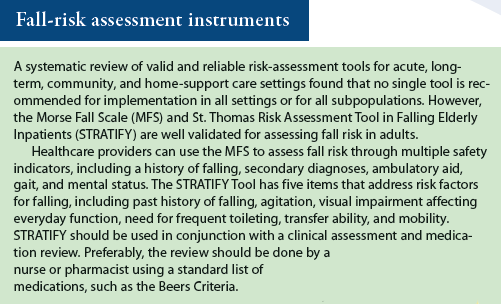The 10-Minute Rule for Dementia Fall Risk
The 10-Minute Rule for Dementia Fall Risk
Blog Article
8 Easy Facts About Dementia Fall Risk Shown
Table of ContentsLittle Known Facts About Dementia Fall Risk.The Dementia Fall Risk PDFsThe Greatest Guide To Dementia Fall RiskDementia Fall Risk - QuestionsThe Facts About Dementia Fall Risk Revealed
You could be nervous since you've had an autumn before or since you have actually discovered you're starting to really feel unsteady on your feet. You could have observed changes to your health, or just seem like you're reducing a little. Whatever the reason, it isn't uncommon to become mindful and shed self-confidence, and this can quit you doing things you used to do and make you really feel extra isolated.If you have actually had an autumn or you have actually begun to feel unstable, tell your medical professional even if you feel fine or else. Your doctor can examine your balance and the method you stroll to see if improvements can be made. They may have the ability to refer you for a falls risk analysis or to the drops prevention service.
This details can be obtained through interviews with the person, their caregivers, and a review of their clinical records. Begin by asking the individual concerning their background of falls, including the regularity and scenarios of any current drops. Dementia Fall Risk. Inquire concerning any type of movement problems they may experience, such as unstable or difficulty strolling
Conduct an extensive testimonial of the individual's drugs, paying specific interest to those recognized to increase the risk of falls, such as sedatives or medications that reduced blood stress. Determine if they are taking multiple medicines or if there have actually been recent changes in their medicine regimen. Assess the person's home atmosphere for potential threats that could boost the threat of drops, such as poor lighting, loosened carpets, or lack of grab bars in the shower room.
The Greatest Guide To Dementia Fall Risk
Overview the individual through the autumn danger analysis type, clarifying each question and videotaping their responses properly. Make certain that the individual recognizes the purpose of the analysis and really feels comfortable giving truthful responses. Determine the total risk score based on the actions supplied in the analysis form. Establish the individual's threat group (low, medium, or high) based on the total rating and the visibility of automatic risky condition aspects.
Consistently keep an eye on the person's development and reassess their danger of drops as required. Provide continuous education and support to promote security and reduce the danger of drops in their daily living tasks.
Numerous research studies have revealed that physical treatment can assist to lower the threat of dropping in grownups ages 65 and older. In a brand-new study (that took a look at falls risk in females ages 80 and older), researchers computed the Homepage economic effect of choosing physical treatment to stop falls, and they found that doing so saves $2,144, consisting of all the concealed prices of your time, pain, missed life events, and the bucks paid for services.
3 Easy Facts About Dementia Fall Risk Shown
Evaluating your balance, toughness, and strolling capability. A home safety analysis. Based on the examination results, your physical therapist will create a strategy that is customized to your particular demands.
Older adults that have difficulty walking and talking at the very same time go to a greater threat of dropping. Dementia Fall Risk. To assist increase your security throughout everyday activities, your physical specialist might design a training program that will certainly challenge you to maintain standing and strolling while you do an additional job. Examples consist of strolling or standing while counting backwards, having a conversation, or bring a bag of groceries
Your physical specialist also can identify which tasks you must prevent to remain secure. Community-based falls avoidance programs aid individuals to: Decrease their worry of dropping. Establish objectives for increasing their exercise. Make their homes much safer. Work out extra to increase their stamina and balance. These programs frequently are led by volunteer coaches.
The 10-Second Trick For Dementia Fall Risk

Measles, or rubeola, is a very contagious, severe viral infectious disease triggered by the measles infection. Some people think of measles as simply a breakout and high temperature that clears in a few days; nonetheless, measles can cause serious wellness issues, particularly in children more youthful than 5-years-old. The most effective security versus measles is the measles, mumps, and rubella (MMR) vaccine.
Loss are an usual cause of injury among older grownups.
All About Dementia Fall Risk

She has pop over to this site no history of falls, her gait is stable, and she invalidates with no problems. The previous nurse states that she calls for aid to the shower room when she requires to go.
Examples of typical autumn interventions/measures consist of: Making certain a patient's essential products are within reach. Putting the client's bed rails up with the alarm on. Assisting an individual while they're rising from bed. Past understanding exactly how to use the Johns Hopkins Fall Threat Assessment Device, it is necessary that centers incorporate its use right into an extra comprehensive autumn prevention plan.
Report this page